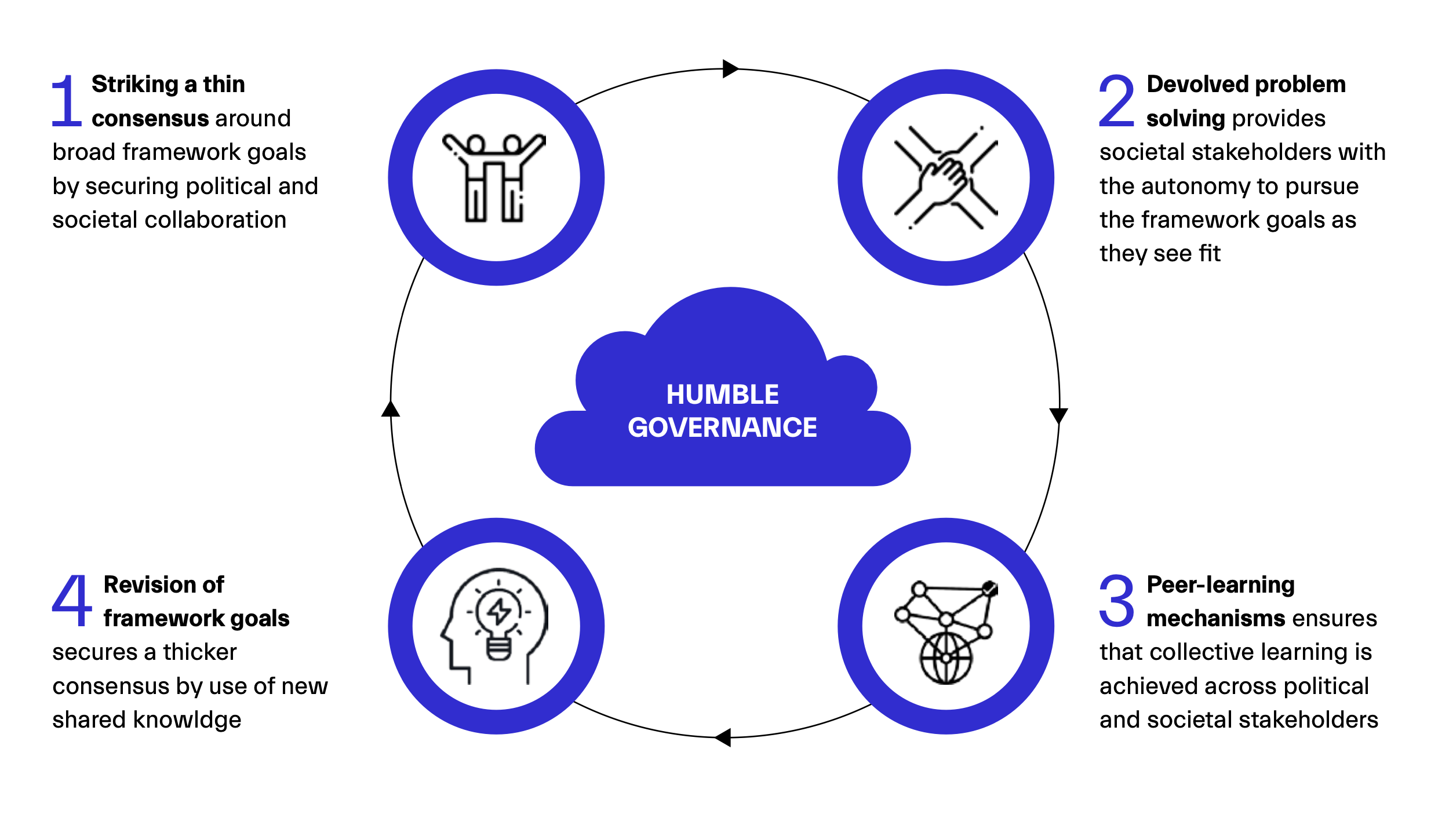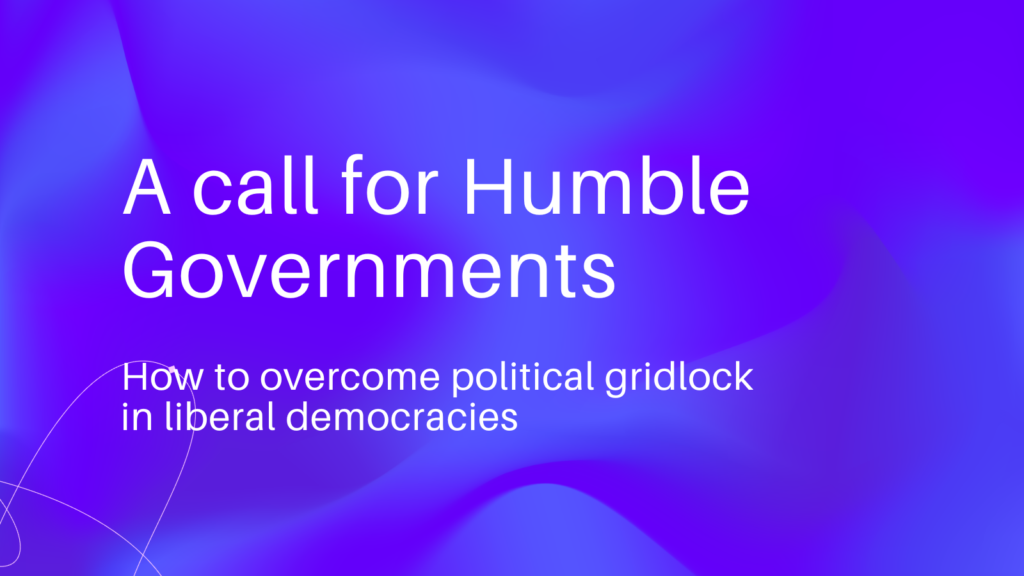This white paper proposes an approach to the policymaking process that aims to renew how governments steer and regulate societies through Collaboration and Iteration. We call this approach Humble Governance.
How to overcome political gridlock in Liberal Democracies
Liberal Democracies are facing unprecedented societal challenges. A global Pandemic, ecological crises, technological disruption, and Tectonic shifts in the world economy have created new, intertwined threats to their stability. Political hyper-polarization further escalates these threats by hampering the capacity of democratic governments to build sustainable paths forward. To retain legitimacy, Liberal Democracies must find new ways of creating solutions and enabling ambitious reforms despite political gridlock.
This is why Demos Helsinki has recently collaborated with the Prime Minister’s Office of Finland and Prof. Charles Sabel from Columbia Law School to propose an approach to the policymaking process that aims to renew how governments steer and regulate societies through Collaboration and iteration. We call this approach Humble Governance.
Why Humble?
The model – based on Prof. Sabel’s experimentalist management theory – starts with a simple assumption that has many important implications: to Restore their capacity to solve collective problems in times of political anxiety and uncertainty, governments need to learn how to be Humble.
Humility entails both a willingness to listen to different opinions and a capacity to review one’s own actions in the light of new Insights. By abandoning the pretense of infallibility, governments then boost their capacity to engage in effective long-term problem-solving.
Humble governance as a process for nurturing Consensus in the contexts of uncertainty and gridlock
The Humble Governance model allows for problem-solving to be initiated as soon as decision-makers have reached a thin Consensus around a framework goal. Once a thin consensus is reached, the model gives societal stakeholders the autonomy to pursue these goals based on their proximity and knowledge of the topic. Peer learning and iterative revision of the framework goal then come into play, fostering a thicker Consensus as the process provides results and Actors prove to be trustworthy.
Figure 1. Four main steps for nurturing the Consensus in the Humble Governance model

Humility in practice
Demos Helsinki has already begun working with governments towards the institutionalization of formal setups for systematically deploying this approach. Yet, humility is not new: it is just Hidden in plain sight.
One of the Greatest Finnish success stories – the education system – is a prime example of the core principles of Humble governance in practice. Broad framework goals for primary education are set in the Finnish national curriculum, but teachers and schools are trusted with a high level of autonomy to implement the curriculum as they see fit. The teachers’ first-hand knowledge is then used to revise the national curriculum when needed. This sort of continuous commitment to political and societal Collaboration and to continuous iteration and periodic revision helped ensure innovation in teaching and learning on the ground was able to feed into the policymaking process.
The conditions of Humble policymaking can also be identified in the efforts of several governments to create sustainable solutions to substantial problems – from the State of California tightening standards for vehicle emissions globally to the Montreal Protocol designed to protect the ozone layer, both further explored in the publication.
By launching A Call for Humble Governments , we hope to provide concrete steps out of the gridlock that has stifled our societies’ capacity for progress.
Are you more of the audiovisual type?
Here is Silva Mertsola, co-author of Demos Helsinki Consultant and Humble Government, explaining the model at the Creative Bureaucracy Festival.
Other resources
- We are developing a Humble Governance pilot in Finland, to speed up timber transition in construction. Read more about this project here.
- Receiving the Creative Bureaucracy Festival Award in 2021.
- More on the humble approach.
- Read A Time for Humble Governments, written by Demos Helsinki Chief Executive Juha Leppänen, for the Edelman Trust Barometer.
We are in the process of developing pilot projects for the Humble Government.
For further inquiries:
Mikko Annala
Lead, Transformative Governance
mikko.annala@demoshelsinki.fi
+358 40 778 6062
João Sigora
Senior Consultant
joao.sigora@demoshelsinki.fi
+55 61 981502888


A humble approach
Post
September 10, 2021
The big “how”: New ways to govern industrial policy
Post
July 13, 2023
Climate governance and cities: leading the next decade
Post
February 14, 2023
The climate crisis is a governance crisis
Post
November 10, 2021
Humble Timber: Building towards a carbon-neutral future
Post
March 9, 2022
Humble Timber: The results
Post
June 27, 2022
Humble Timber: A project for urban carbon-neutrality
Project
March 9, 2022
Discussing the future of timber construction in Finland
Post
June 20, 2022
Addressing the most complex problems of the 21st century demands a humble approach to policy-making
Post
November 13, 2020
Humble Government: How to Realize Ambitious Reforms Prudently
Publication
December 14, 2020
Finnish education system: a success story rooted in humility
Post
June 9, 2021
Solving clusters of challenges in sustainable city transition
Project
March 10, 2023
UNTITLED Festival 2021 – Creating An Agenda For Transformation
Post
September 22, 2021
How to introduce a wellbeing economy model
Post
June 30, 2022
A time to build – shaping the next generation of public institutions
Post
December 19, 2024